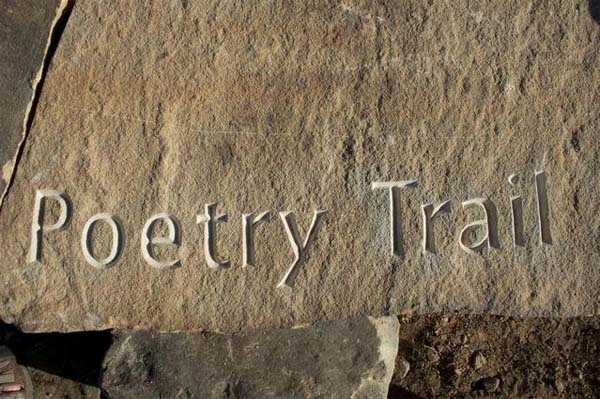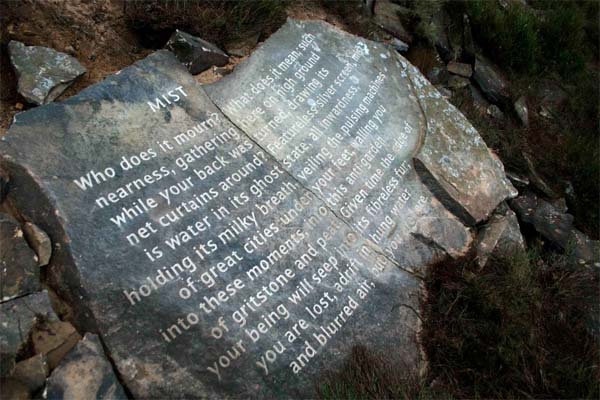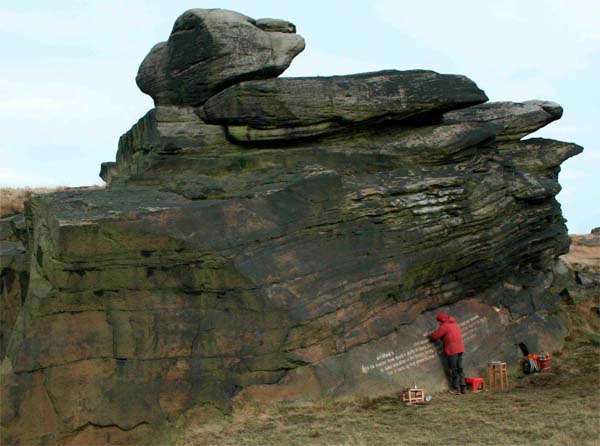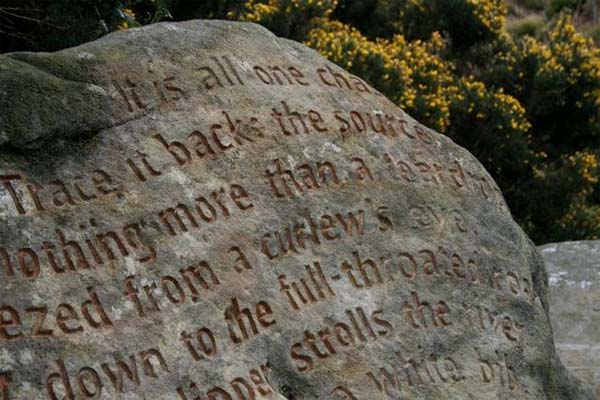Stanza Stones

It was lovely to see the Stanza Stones featured on Countryfile – what a special collaboration this is between Yorkshire poet Simon Armitage and the Ilkley Literature Festival. The project was devised to get people into the landscape and inspired to write. Six poems were carved into the rock along the trail that takes in the some of the best scenery West Yorkshire has to offer.

Simon Armitage wrote a set of poems inspired by the language and landscape of the Pennine Watershed, which were then carved onto stones across the upland by stone artist Pip Hall, forming a permanent ‘Poetry Trail’ from Armitage’s home town of Marsden to the Festival’s base in Ilkley.

You can visit individual stones or ambitiously walk the whole route, some 47 miles – I’m half (definitely) thinking of adding this to my list of ‘to do’s’ this year. I love that the stones are named so simply, describing the conditions of their place – The Snow Stone, The Rain Stone, The Mist Stone, The Dew Stones, The Puddle Stones and The Beck Stone.

If you were to have a poem inscribed in stone, or a saying, or even a single word, which one would it be? Or, have you written one you’d like to see cut in stone – I could do the lettering bit, if you supply the words.
Or perhaps you could carve your own letters – I have some places on my course in the Autumn – Lettercutting in stone course.

7 Comments
I found this a very thought-provoking post Jennifer. On the one hand I think the idea of poetry carved into stone in a natural landscape is lovely, but something about it also makes me uncomfortable, perhaps because the stones are ‘living’ in the sense they are part of the landscape and haven’t been placed there by people. But then I suppose there is a long heritage of written stones going right back to Ogham and the Pictish carvings in Scotland. I shall ponder on it further :o)
So interested by your response – though I find great beauty in letters cut in stone and the idea behind these ones – to encourage creative writing and involvement and contemplation about our landscape – a small snag for me is that it is a sort of graffiti, which I like less, but which seems ever popular. I must point out that these stones (for the most part) are the result and debris from historic quarry workings and stones replaced for the purpose. A big nod about stone being ‘living’! We have wonderful cup and ring and early stone carvings on rock on the moors here. Would love you to share your further ponderings.
Graffiti, that’s exactly it, that’s what was nagging at me but I couldn’t find the right word! It does make a difference if the stones have come from quarry workings, somehow it feels less intrusive? Its a dichotomy because I love the ancient cave paintings in France which are no different really, and I do love the idea of beautiful words gracing these landscapes. You have really got me thinking about this this morning! x
I did watch this and they do look beautiful as well as the words, we live quite close , so worth a visit.
Amanda xx
It was great to see the presenter having a go too – think I might go in summer though!
Hi
I’ve published Simon’s poems in a Fine Press edition. Each poem is illustrated with a beautiful wood engraving. The book is called ‘In Memory of Water’. I asked Simon if I could do the book, even though I’d had no experience in publishing before, because I thought Stanza Stones was a wonderful project. Simon’s poems are excellent. Rain is my favourite poem but I love the last lines in Mist – “you are lost, adrift in hung water and blurred air, but you are here”.
Best wishes
Andrew
Your publication looks just beautiful, with the woodcut illustrations – it was a lovely idea to do a fine press limited edition of his poems. And, I agree about the reward of holding a special book in the hand.